
Cooking Up a Hooley in the Kitchen: Scones Anyone Can Make
I am much more of a savory person. Yet, oh my goodness do I love scones!
They are perfect because they are …
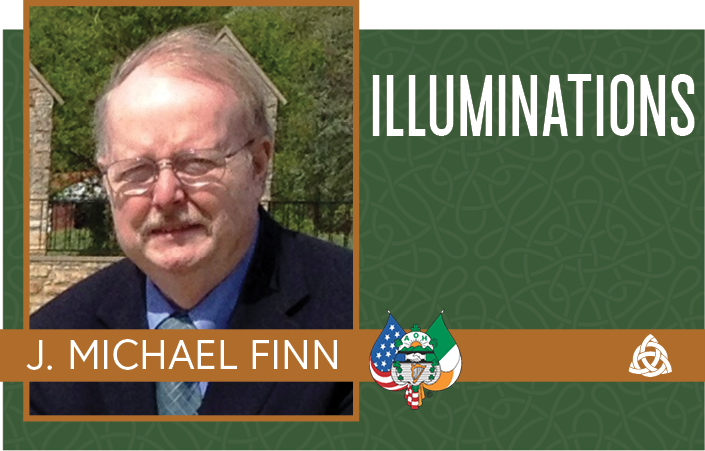
By Mike Finn
Richard James Mulcahy, Irish revolutionary and politician, was born in Manor Street, Waterford, on May 10, 1886. His parents were Patrick Mulcahy, a post office clerk, and Elizabeth Slattery. Richard was educated at Mount Sion Christian Brothers School in Waterford and later attended school in Thurles, County Tipperary, where his father was transferred in 1898 as postmaster.
Although his five sisters, four of whom became nuns, graduated from the Royal University of Ireland, the family’s financial difficulties forced Richard to turn down a scholarship to Rockwell College in Tipperary.
He left school at sixteen to join the post office, working at Thurles. He was later transferred to Tralee, Co. Kerry; to Bantry, Co. Cork where he spent time in Ballingeary, in the heart of the west Cork Gaeltacht; and then to Wexford.
Mulcahy had already joined the Gaelic League in Thurles, where he also discovered the United Irishman, the newspaper founded by Arthur Griffith. As with so many Irish nationalists, Griffith was his guru for, as Mulcahy later wrote, “It was Griffith who most fully painted in his weekly writings for us the traditions and the resources of Ireland, portrayed its mission and gave us for practical purposes our dream, our sense of work.”
Mulcahy was convinced that self-education was his path to advancement; he won promotion to the engineering branch of the post office by private study, and he was already a fluent Irish-speaker when he was transferred to Dublin in 1907. On arrival in Dublin, Mulcahy joined the Keating Branch of the Gaelic League.
He passed the matriculation examination before enrolling for a diploma in engineering, which he took through night classes at several technical colleges, but in 1911, the post office refused him a three-year leave of absence to take up a scholarship at the College of Science. This setback further thwarted his educational advancement.
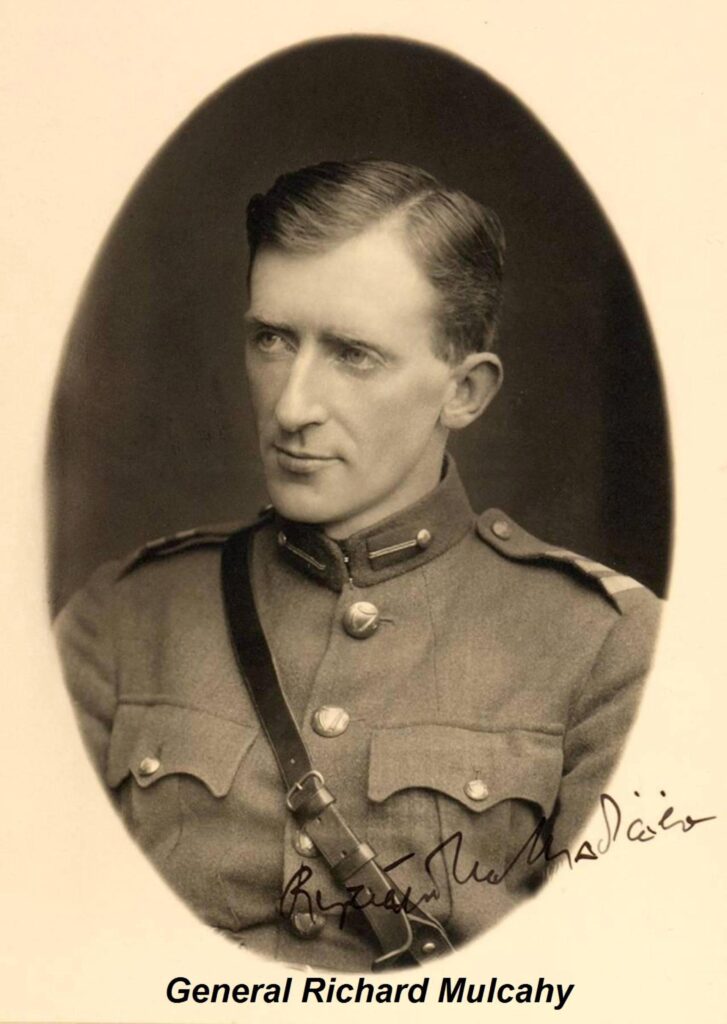
Mulcahy’s education with nationalism progressed through his membership of the Keating branch of the Gaelic League, where he met many other future leaders of the revolution, including Cathal Brugha, Tomas Ashe and Michael Collins. Mulcahy also joined the Irish Republican Brotherhood (IRB) in 1907.
As an IRB member, Mulcahy was instructed to join the Irish Volunteers at their inaugural meeting at Dublin’s Rotunda Hall on November 25, 1913. At the meeting, he was appointed second lieutenant in the 3rd Battalion of the Dublin Brigade.
He trained regularly on weekends and at summer camps. Mulcahy was promoted to first lieutenant shortly before the 1916 Easter Rising.

Upon the outbreak of the Easter Rising, Mulcahy’s unit cut the communication lines to Belfast and Britain in north Co. Dublin on April 24, 1916. Mulcahy became isolated from his battalion and instead joined the Volunteers 5th (Fingal) Battalion led by Thomas Ashe, who made him his second-in-command in successful raids for arms and ammunition on the RIC barracks at Swords and Donabate.
A raid on the Ashbourne barracks on April 28, 1916, ended in the RIC’s surrender after ten of their number were killed. It was one of the few military victories of Easter Week. Ashe’s force was the last to surrender, and he and Mulcahy were among the few Volunteer officers to emerge from the Rising with enhanced military reputations.
Following the surrender, Mulcahy was interned in Knutsford Prison in Cheshire from May 3 until June 17, and then was transferred to Frongoch internment camp in north Wales (Frongoch was known among the prisoners as “Sinn Féin’s University”). He was released on December 3, 1917, with the last batch of untried political prisoners.
On his release, Mulcahy immediately rejoined the republican movement and became commandant of the Dublin Brigade of the Irish Volunteers. He was elected to the First Dáil in the 1918 general election for Clontarf. He was then named Minister for Defense in the new provisional government and later Assistant Minister for Defense.
In March 1918, Mulcahy became IRA Chief of Staff, a position he held until January 1922. Mulcahy managed to evade capture in the “German plot” arrests. This further enhanced his personal stature.
Unlike many of his contemporaries, he was never jailed again, notwithstanding the government putting a price of £10,000 on his head. He and Michael Collins were largely responsible for directing the military campaign against the British during the Irish War of Independence. Mulcahy became known as Collins’ “right hand man.” Collins’s death, on 22 August, 1922, pitched Mulcahy, who succeeded him as the national army commander-in-chief, into the limelight when he filled the leadership vacuum with a morale-raising funeral oration against reprisals.
During this period of political upheaval in 1919, Mulcahy married Mary Josephine (Min) Ryan. Min, was a member of the Cumann na mBan Executive, and was involved in nationalist activity at the time of the Rising. The Mulcahys had six children.
Mulcahy supported the Anglo-Irish Treaty of December 1921. Archive film shows that Mulcahy, as Minister of Defense, was the Irish officer who raised the Irish tricolor at the first hand-over of a British barracks to the National Army in January 1922.
Following the end of the Civil War, Mulcahy continued to be active in Irish politics. He was elected to the Dáil from 1918 to 1938, and from 1943 to 1961, and to the Seanad from March 1938 to June 1938. He served as leader of the Fine Gael Party from 1944 until 1959.
He was appointed as Minister for Defense from January to April 1919 and from 1922 to 1924; Minister for Education 1948 to 1951 and from 1954 until 1957; Minister for the Gaeltacht (Irish speaking areas) from June 1959 until October 1956; and from 1927 to 1932 he served as Minister for Local Government and Public Health. He also served in the cabinets of W. T. Cosgrave and John A. Costello.
Mulcahy resigned as leader of Fine Gael in October 1959 and retired from active politics at the next general election, in October 1961. He spent most of the following decade collating the voluminous collection of papers he had amassed throughout his career and in compiling tape recordings to complement them. These historic records and recordings are currently in the archives of University College Dublin.
General Richard Mulcahy died of cancer in Dublin on December 16, 1971, at the age of 85. He is buried inBallymoreen Cemetery, Thurles, Co. Tipperary.
Read more of Mike’s Illuminations Columns HERE


I am much more of a savory person. Yet, oh my goodness do I love scones!
They are perfect because they are …

but that’s not the point. Poets write to be heard.
Some of the best music, dance, festivals, culture and other events across our Irish community
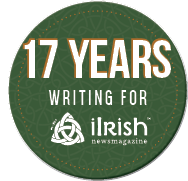
*J. Michael Finn is the Ohio State Historian for the Ancient Order of Hibernians and Division Historian for the Patrick Pearse Division in Columbus, Ohio. He is also past Chairman and Life Member of the Catholic Record Society for the Diocese of Columbus, Ohio. He writes on Irish and Irish-American history; Ohio history and Ohio Catholic history. You may contact him at [email protected]
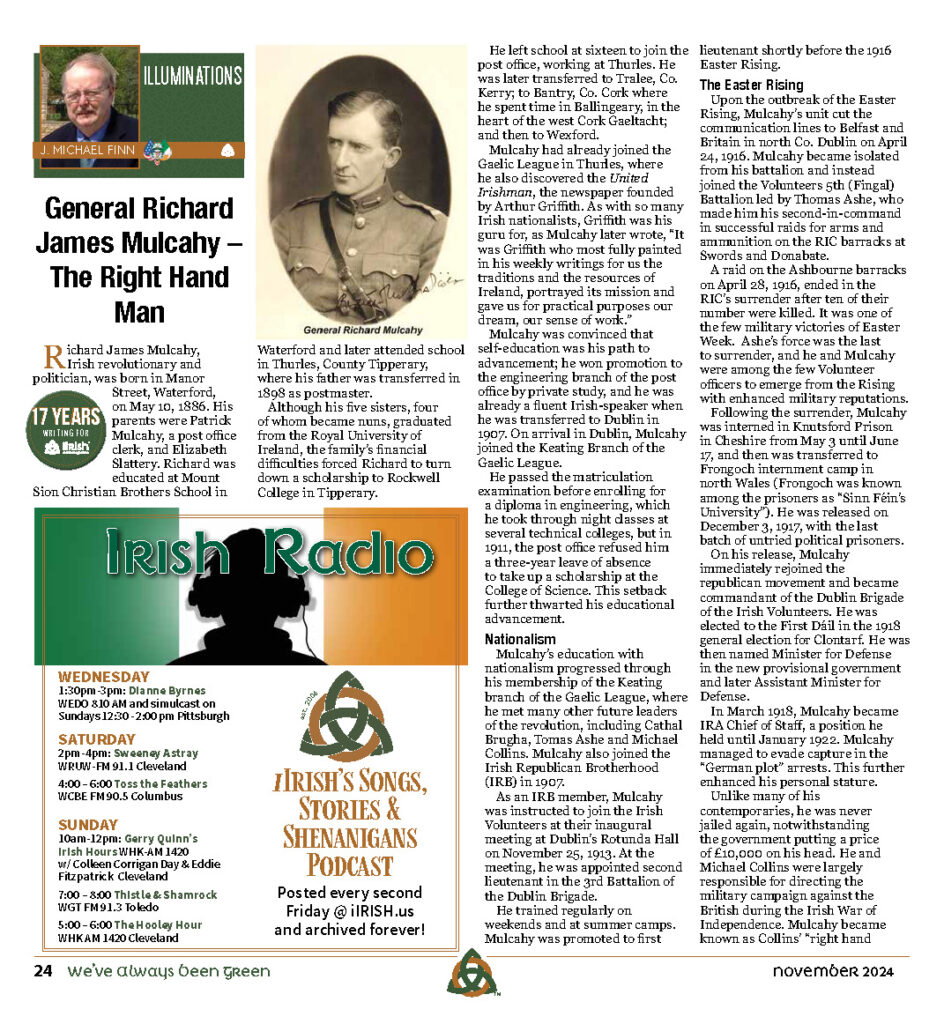
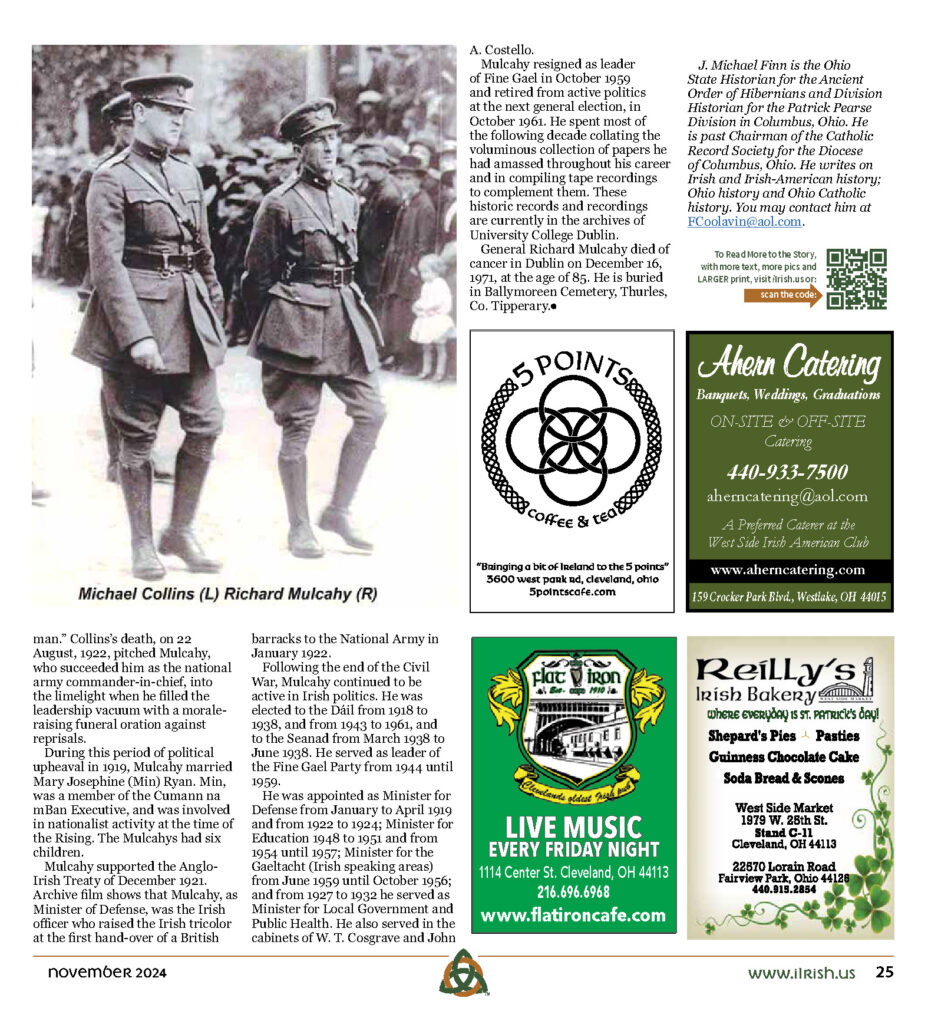
By submitting this form, you are consenting to receive news and event emails from iIrish, 14615 Triskett Road, Cleveland, OH, 44111-3123, US, https://iirish.us. You can revoke your consent to receive emails at any time by using the SafeUnsubscribe® link, found at the bottom of every email. Emails are serviced by Constant Contact.

iIrish now has branded merch! Be an official iIrish Craictivist, or grab other soft, warm, breathable gear.
Click below to visit our store and grab your favorite iIrish gear today!
